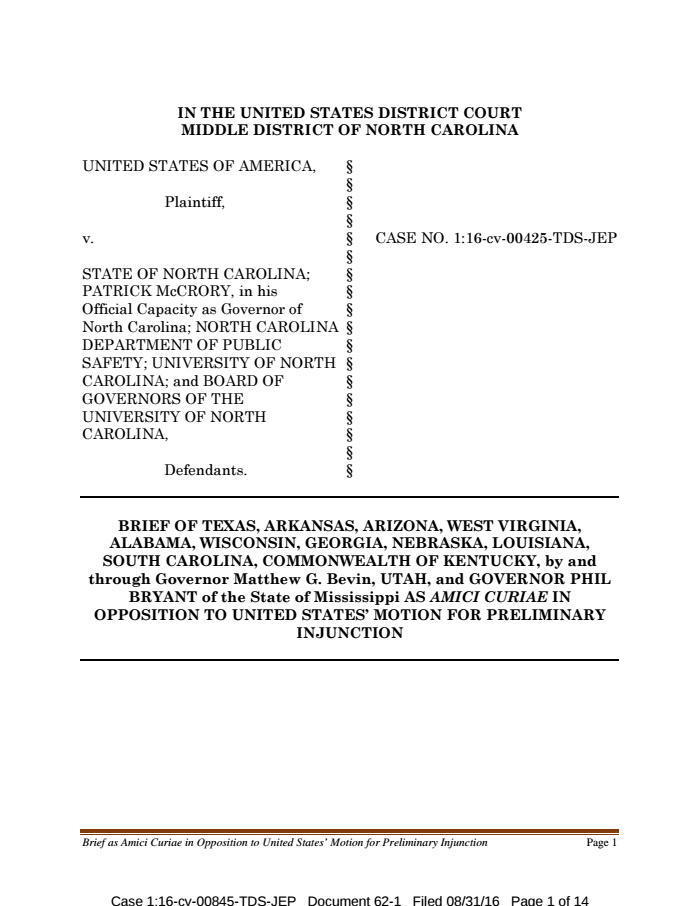
WASHINGTON — Texas and 12 other states injected themselves on Wednesday into the ongoing legal battles over North Carolina's anti-LGBT law — by asking a federal judge to put those lawsuits on hold for now.
The law, HB 2, was passed earlier this year, and one of the provisions — the subject of several lawsuits — limits public restroom usage to people's "biological sex," using a definition that targets transgender people unable to get their birth certificate changed to reflect their gender identity.
Texas Attorney General Ken Paxton, joined by 10 other state attorneys general and two governors, specifically asked U.S. District Court Judge Thomas Schroeder to put the Justice Department's pending challenge to that law on hold while other cases proceed.
The Obama administration has asked Schroeder to halt enforcement of the anti-transgender provision, and he heard arguments over that request on Aug. 1. Putting the cases on hold as Paxton and the other states' officials asked in the unusual filing on Wednesday (or denying the Obama administration's request, a move the brief also supports) would mean that the anti-transgender law would remain in effect for the time being.
Paxton and the state officials cite an injunction issued in the case that Texas and several other states brought against the Obama administration's pro-transgender policies as a key reason for judge in North Carolina to issue a stay in that case — despite the fact that the injunction issued in the Texas case specifically exempted previously initiated litigation from that order.
The legal fight that has erupted over transgender restroom usage in the past few years has, generally, taken three forms of cases: those filed by individuals challenging anti-transgender policies; those filed by states or state officials challenging the Obama administration's position that existing civil rights laws protect transgender people from discrimination; and those filed by the federal government challenging anti-transgender actions, policies, or laws.
U.S. District Court Judge Thomas Schroeder, hearing several of the many challenges to the North Carolina law, issued a narrow injunction this past week in a case brought by students and employees of the University of North Carolina against the state and university. In the injunction, he ordered the school and government not to enforce the part of HB 2 that limits public restroom usage to people's biological sex — but only as to the people who brought the lawsuit.
A big part of Schroeder's decision was based on a prior decision of the 4th Circuit Court of Appeals — where appeals from federal courts in North Carolina are heard — holding that the Obama administration's interpretation that Title IX of the Education Amendments of 1972 protects transgender people from discrimination is a permissible interpretation of the regulations implementing that law. The school district in that case — Gloucester County School Board v. G.G. — currently is seeking Supreme Court review of the 4th Circuit's decision.
Schroeder has not, however, yet ruled on the more broad request by the Justice Department to halt all enforcement of that anti-transgender provision in HB 2.
The move by Paxton and the other state officials on Wednesday of asking to file a brief before Schroeder's court opposing the Obama administration's request was unusual because it came nearly a month after Schroeder held arguments in the matter. Paxton was joined on the brief by the attorneys general of Arkansas, Arizona, West Virginia, Alabama, Wisconsin, Georgia, Nebraska, Louisiana, South Carolina, and Utah — as well as the governors of Kentucky and Mississippi.
While ostensibly an opposition to the Justice Department's request for an injunction, the brief also was unusual because the state officials used it to urge Schroeder to put the North Carolina cases on hold — pressing the arguments that prevailed in front of the judge in Texas before Schroeder in North Carolina and arguing to Schroeder that the injunction should influence what he does next in the cases before him.
"While the Injunction [in the Texas case] does not specifically prevent DOJ from continuing this litigation," the state officials note, "and this Court has acknowledged the same" — referencing Schroeder's order from this past week — "it nonetheless supports ... staying these proceedings" until the Supreme Court decides whether to hear the appeal of the Gloucester case and until the 4th Circuit addresses an appeal of Schroeder's injunction regarding the individual plaintiffs and UNC.
Additionally, Paxton and the other state officials argue that the injunction in the Texas-led federal challenge supports "denying the [injunction] requested" by the Justice Department. "Indeed, now that the federal policies at issue are subject to a nationwide injunction, will be inspected again by the Fourth Circuit, and also scrutinized by the Supreme Court, granting the United States’ preliminary injunction motion would bestow upon North Carolina the distinction of making it the only State unable to enforce its policy regarding access to intimate areas," the brief argues.
The same group of state officials sought to file a brief in one other case on Wednesday, supporting the Highland Local School District's school board in Ohio in its request for a preliminary injunction against the Education Department.
UPDATE
This report was updated to include information about a filing by Texas Attorney General Ken Paxton and other state officials in an Ohio case, as well as additional information about the provision at issue in HB 2.

